Release Date: March 14, 2025
A welcome and introduction
Welcome! I’m excited to share a recent conversation I had with Deborah Carl, a professional genealogist and Substack content creator at Narratives, Proof, Arguments and Genealogy Tips. A while back, Deborah put a comment on one of my posts about a her family’s secret recipe, and I was enthralled, so asked if she’d come and join me to talk about that recipe, as well as a bunch of other culinary history and genealogy topics.
Before we get to our conversation, I wanted to share a few of my favorite posts from Deborah’s newsletter:
Research Plans — A great example of how to create and use a research plan
Sharing Photos and Artifacts —Deborah looks at the often overlooked Family Search feature called “Memories”, and how she uses it in her own family research.
The Family of Wilfred Jennett and Julia Hall —the story of the eight people buried in Range 21, Lot 36 of the Woodlawn Cemetery, only one of whom has a marker
Deborah focuses on telling the every day stories of every day people, and she’s doing a great job! Here’s our conversation.
We all have origin stories
LORI:
Hi, Deborah and thanks for sitting down with me today. Let’s jump right in. What's your origin story for genealogy. Where'd you start?
DEBORAH:
It started with my mother who was a professional genealogist, and she would drag me to libraries and graveyards. And my dad had the bug, too. He was interested in his family genealogy. So I started early. As soon as I learned how to read and write, books were put in front of me, and told, “go look”.
And I did that to my son, too. He was in Boy Scouts, and it was like, “you have to get the genealogy merit badge”. I took him to the library with microfilms and handwriting, and said, “I'm looking for this one person in this area,” and his young eyes found it in two seconds.
LORI:
When you were little, doing it with your parents, how did that work? Did they just point you in the right direction, or did they give you a task? Or how did that work?
DEBORAH:
Well, in the library, they would give me a task, they'd give me a book and say, “this is what you're looking for,” just like I did with my son with the microfilm and graveyards.
I take my husband with me. I'm like, “We're going to do Find a Grave,”. It's basically a scavenger hunt. I'll have lists of names and approximate places. It can be fun.
LORI:
I love graveyards. I usually try to stop at some when we’re traveling. I remember when my kids were little, they're like, “I'm not getting out of the car. I'm staying in the car.” I just think cemeteries are fascinating. So many stories.
DEBORAH:
I'm working on my grandkids. We took them to Salem, MA, and none of the adults wanted to go into the graveyard, but the kids did. It's a very old graveyard. They've got the paths chained off, and so I had to teach them a little bit of etiquette before we went in.
I gave my oldest grandson my phone and said, “take pictures”, because I wanted him to take pictures of the family. Well, he starts taking pictures of the graves because that's what he sees on grandma's phone!
LORI:
What a great way to introduce something fun. It's adventurous, like you said, kind of a scavenger hunt.
It's always a challenge to get that next generation involved. I think sometimes it's easier to skip the generation, you know. So like, my kids aren't interested, but I'm working hard to make sure that my grandkids are. And it sounds like you're kind of working that angle too.
We have to keep telling the stories, right? Otherwise they just die.
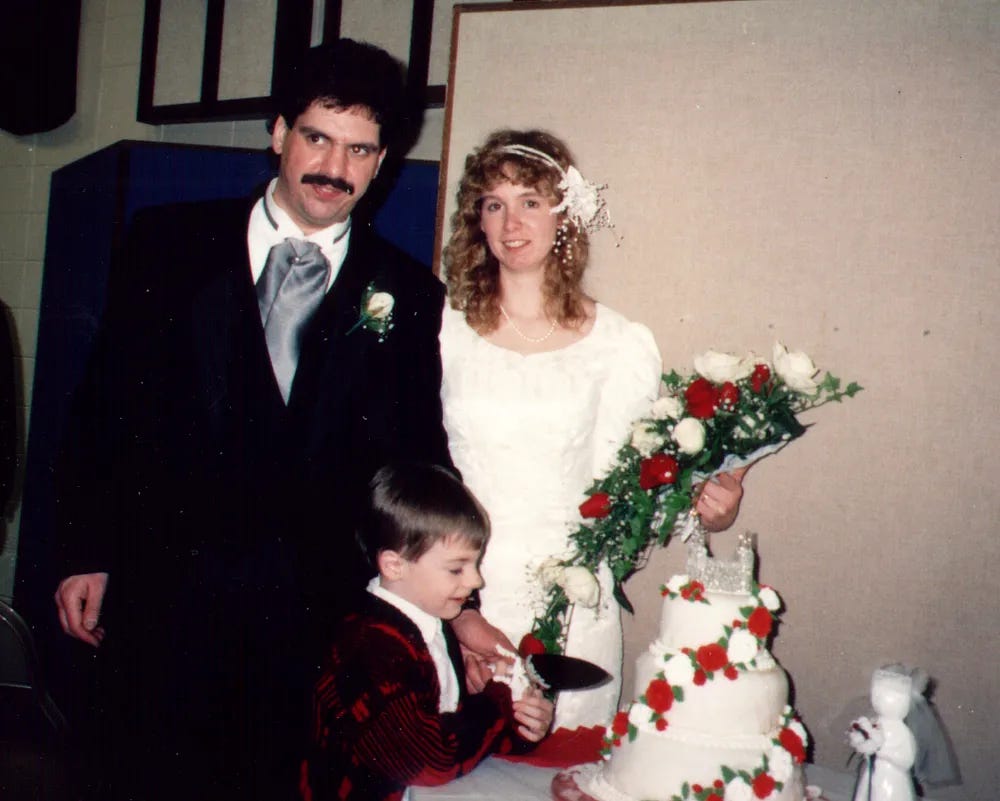
A secret family recipe
LORI
Let’s move to that secret family recipe, because I think that’s just incredible.
Start with when you knew you had a secret recipe in your family, where it came from, and how its passed on. I want to know everything!
DEBORAH:
The fruitcake recipe belonged to my great grandmother, Elizabeth Glendenning Luke. It was in a cookbook that got passed on to my grandmother, and she's the one who wrote in the front [of the cookbook] the provenance: [the recipe] had come from her mother, and that it was to go to either her daughter (my mother) or her grandchild. She had two granddaughters, and my sister ended up with the cookbook.
But my mother had given me a copy of the fruitcake recipe, because I was the oldest, and she wanted me to have it. She made very clear that it was absolutely secret, and I was not to share it with anyone.
LORI:
But you could bake it?
DEBORAH:
I have never baked it.
LORI:
Oh really! That’s so interesting! It's not something you make traditionally. It’s the recipe itself, not the end product of the recipe that's passed on and important to you.
DEBORAH:
My mother made it a handful of times. I asked her to make it for my wedding cake, because fruit cake is a traditional English wedding cake, and it had the almond paste frosting and everything. It was absolutely beautiful!
After you and I talked, I went on to Family Search, and I found that I had written about the cake, and how my mother had made it and hired somebody to decorate it, and I mentioned in there that the recipe that's being passed on is not complete, that my mother told me a few things that had been left out.
LORI:
Tricky!
DEBORAH:
Of course, I don't remember what was left out, so I have to call Mom and ask, or it will be lost forever.
LORI:
I love that detail! I've heard other people who have a secret ingredient they add to a recipe, like nutmeg or something, but when they write it out and give it to the church cookbook or something, that ingredient isn’t included. So it's interesting that that's how your family handled it, too.
Do you know where your great grandma got the recipe?
DEBORAH:
The legend is that she perfected it, that this was her recipe.
LORI:
That is very cool. You said you got a copy of the fruitcake recipe from your mother. Was that a handwritten recipe or a copy of the original?
DEBORAH:
It's handwritten. Actually, I think Mom must have shown the recipe to me, because the one I have is in my handwriting.
LORI:
Gotcha. In my head – again, not having any secret family recipes – I imagine a secret ceremony where the recipe comes out on a silver plate, and ta-da! Maybe I watch too much tv!
DEBORAH:
I think Mom was just making it one year and said, “You know, now that you're cooking, this is a special family recipe, and don't share it with anybody.”
I'll have to go find my copy, because maybe the secret is scribbled in there in the notes!
LORI:
What significance does the secrecy have when you talk about your secret family recipe? Does it make it more special? Does the recipe mean more because it’s just for your family?
DEBORAH:
It gives me a sense of responsibility to protect it and preserve it and pass it on. Mother made it a couple of times. I've never made it, and when I pass it on, the next generation will probably never make it either, but it has still become a family legend.
A family’s not-so-secret sauce
LORI:
Are there any other family recipes that maybe have been passed down, or are maybe even are just Iclosely-held secrets?
DEBORAH:
My mother-in-law was from Naples, Italy, and she taught me how to cook Italian food. She did not measure anything. She would put the ingredient in her palm, and then I would measure what she put in her palm and write it down in my recipe.
LORI:
So how do you write it down? Like, “half a palm”, or, what?
DEBORAH:
No, I would get out my measuring spoon. I’d pour it in there and write that down. I don't measure anymore. Once you get used to it, it’s just what you do. My husband gives me a hard time, “Are you sure it's a teaspoon?” I take my hand and put it into a teaspoon. “Oh, look, it's a teaspoon!” It's pretty close!
LORI:
That's why I don't bake a lot. I feel like baking is more of a science and cooking is an art. I don't know if that's true or not, but that's kind of how I look at it. You have to be really precise when you’re making, and that's not really my jam. But with cooking, I hardly measure anything anymore. I just kind of say, “this is about right”.
DEBORAH:
Yeah, I agree with the baking because, you know, if you're using baking powder or baking soda. It does have to be exact.
LORI:
It can go bad fast! OK, back to the Italian food. Does that side of the family have secret recipes too, or just kind of undocumented recipes?
DEBORAH:
Everybody wanted my mother-in-law’s spaghetti sauce recipe, and I asked for permission to share it, and family members were like, “yeah, go ahead”. So it's been pretty much shared with everyone who has ever asked for it, and there have been a lot of people who’ve asked!
A recipe lost
DEBORAH:
We lost a recipe. My mother-in-law used to make something called giardiniera, and I went on the internet, and the giardiniera recipe I'm finding is not what she made. She was from Naples. Her husband's family was from a couple towns over, called Acerra.
I'm in contact with a lot of people in Acerra throughout genealogy, and I wrote and asked if anyone had a giardiniera recipe, but none of them were the right one.
It's not the giardiniera recipe you find on the internet that's kind of spicy. This was sweet.
LORI:
Maybe it's one of those secret. recipes that nobody's going to let you have.
Okay. Shout out to everybody on Substack. If you have a giardiniera recipe from the Naples or Acerra areas of Italy, contact Deborah Carl. She's looking for it.
DEBORAH:
Yeah, it's gone, and that's very sad.
Telling the stories
LORI:
I really enjoy telling the stories of family food and family meals and things like that. So many memories are happening in the kitchens, especially with our grandmothers and great-grandmothers, aunts and mothers – the matriarchs of our families. And we pass those stories down in our own kitchens, whether it's a recipe or just standing next to each other baking or eating it at the table and talking about where, and who, the foods we’re eating come from.
That’s kind of why I started my Culinary History is Family History newsletter on Substack, because I love those stories about how food connects us across time. It sounds like you've got a lot of those kind of stories in your family history, too.
DEBORAH:
Well, with half the family being Italian, food is very, very important. In fact, my husband does a little comedy skit of his mother, because she would tell you what somebody ate before they died, because food was so important.
LORI:
Like, what they ate that caused them to die? Or their last meal?
DEBORAH:
You know, “Uncle Sam, he died. He had a piece of corn.”
LORI:
Do you know why she did that? I mean, because food was so important, or because what they ate sent them off in a good way? I've never heard of that before. I’ve got all German heritage, so I don't know much about the Italian family lore around food, but that’s definitely interesting!
DEBORAH:
A lot of Italian culture revolves around food. So even with my own boys, if they fell down and skinned their knees, I'd say, “Oh, Italian comfort!” And I’d give them a piece of candy or a cookie, and it does, it makes it all better.
LORI:
Candy and cookies make everything better, right? And with that, we’ll wrap this up. Thanks so much, Deborah. And good luck finding that lost recipe!
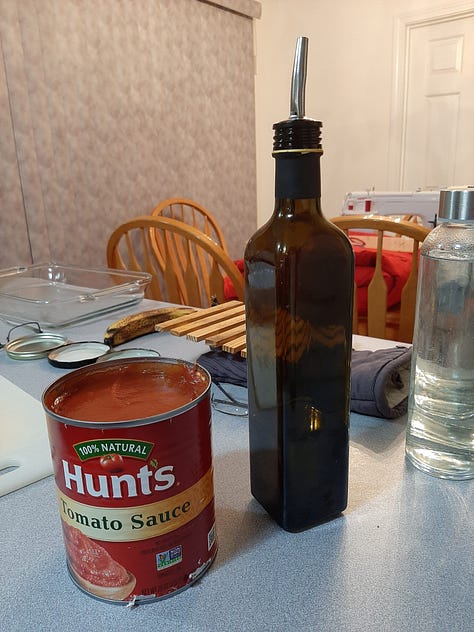
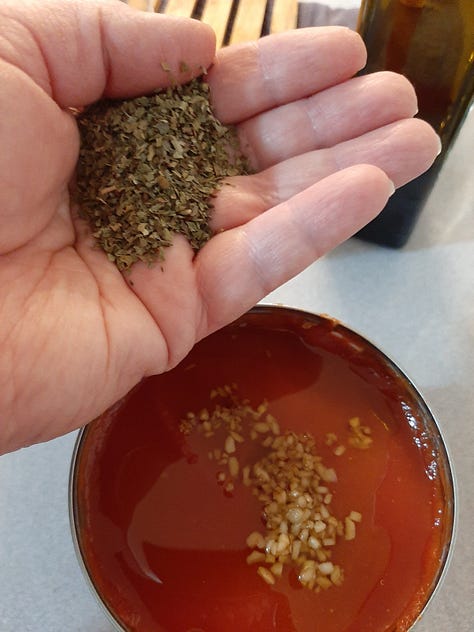
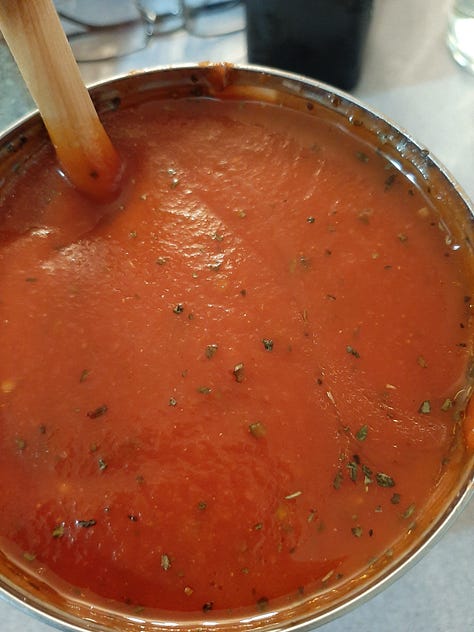
The Much-Shared Spaghetti Sauce
So I start with a #10 can of Hunts tomato sauce and dump it in a crockpot. It must be Hunts (pronounced 'unts - my mother-in-law dropped the 'h' in front of words).
Take 1/4 cup olive oil (I used regular because it has a higher smoking point but now days the extra virgin is cheaper so I use that) and fry a tablespoon (if using the pre-chopped stuff in a jar, less if using fresh as it is stronger) garlic.
Add to the tomato sauce. 1/3 cup dried basil rubbed between your hands into the sauce. (I grow and dry my own basil and I use store-bought because I don't produce enough. I rarely use fresh since the rubbing releases the flavor and I like to see the flecks all through the sauce.)
Then I let it cook on high for 3 hours.
If I were making meatballs, they would be browned and cooked in the sauce for the 3 hours. I'd need to skim the grease off the top of the sauce before fishing out the meatballs and sauce. Most of the time I cheat and cook the meatballs in the oven before adding to the sauce (still cook 3 hours in the sauce so they can absorb the flavor) and I still have grease to skim off.
I grew up with a low-salt diet so I don't add any to the sauce and my mother-in-law didn't either. If I want to add salt to my spaghetti, I sprinkle Parmesan cheese on top. I also don't use salt or oil in the water to boil the spaghetti.
DEBORAH’S SECRET FAMILY RECIPE makes a fruitcake, and I couldn’t help but share that our family traditionally gives Fruitcakes as gifts, and that we always buy them at Collin Street Bakery in Corsicana, Texas. Shout out to the wonderful folks down there!
DEBORAH MENTIONED THAT HER HUSBAND’S ITALIAN SIDE of the family has lost a special recipe for giardiniera. Let’s see if we can help them out! If you have a giardiniera recipe from the Naples or Acerra areas of Italy, please drop it into the comments. Thanks!
HERE’S A LINK TO THE STORY Deborah shared about her wedding cake which was made by her mom from her grandmother’s secret fruitcake recipe. Yum!
Please hit the ❤️ button at the bottom of the page to help this story reach more readers. And if you’re not already a subscriber, I’d love to have you join me. Thanks!
If you’d like to drop by and chat about culinary history, the intersection of family history and food or just shoot the breeze, drop me a note and let’s talk!
In case you missed it
If stories at the intersection of food and family history are what you’re looking for, look no further than our archives! Here are a few of our favorites.
Culinary History is Family History is reader-supported. When you buy through links on our site, we may earn an affiliate commission.





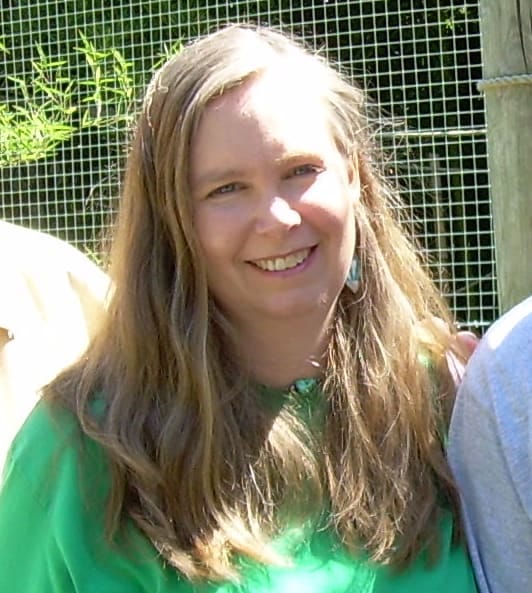
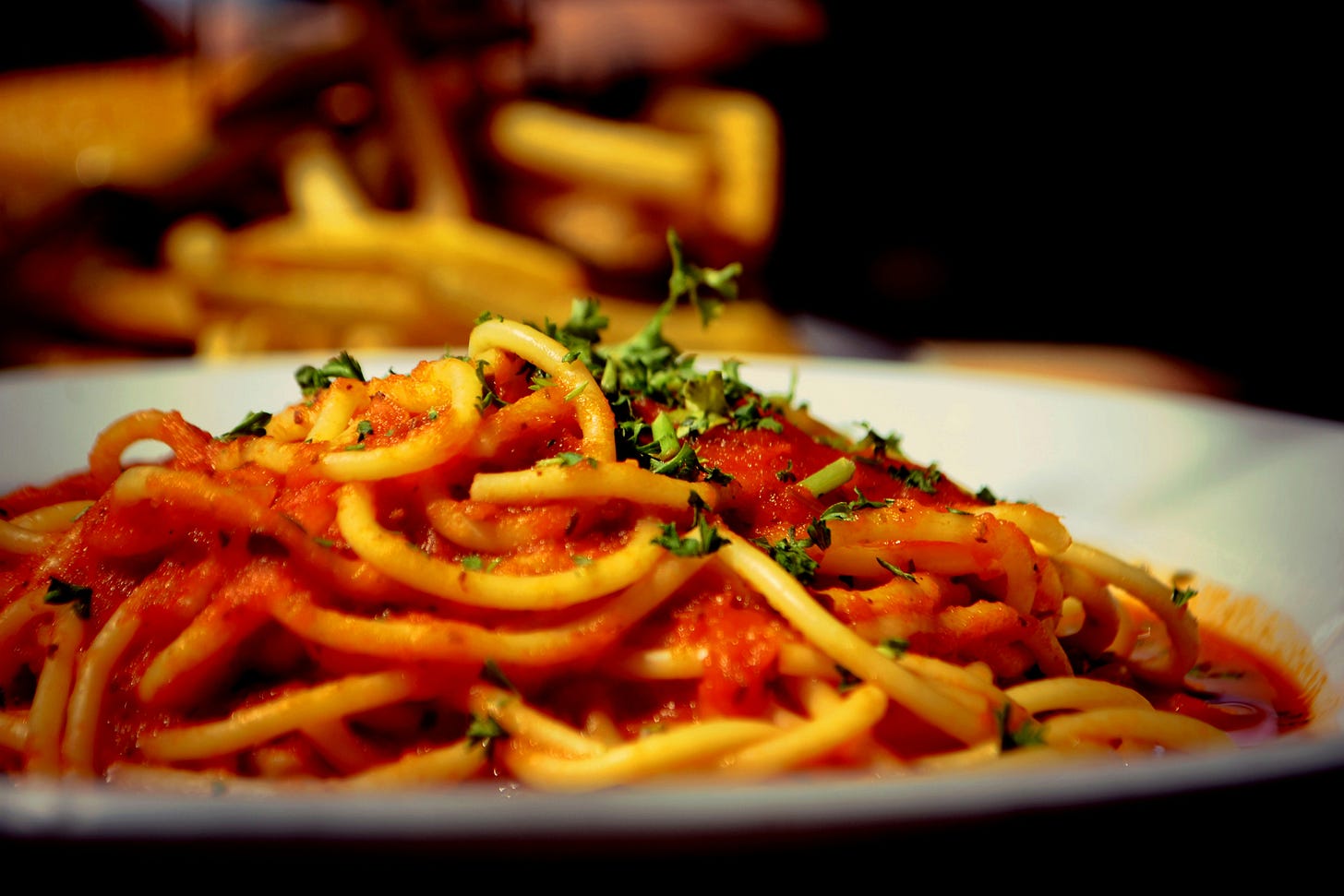
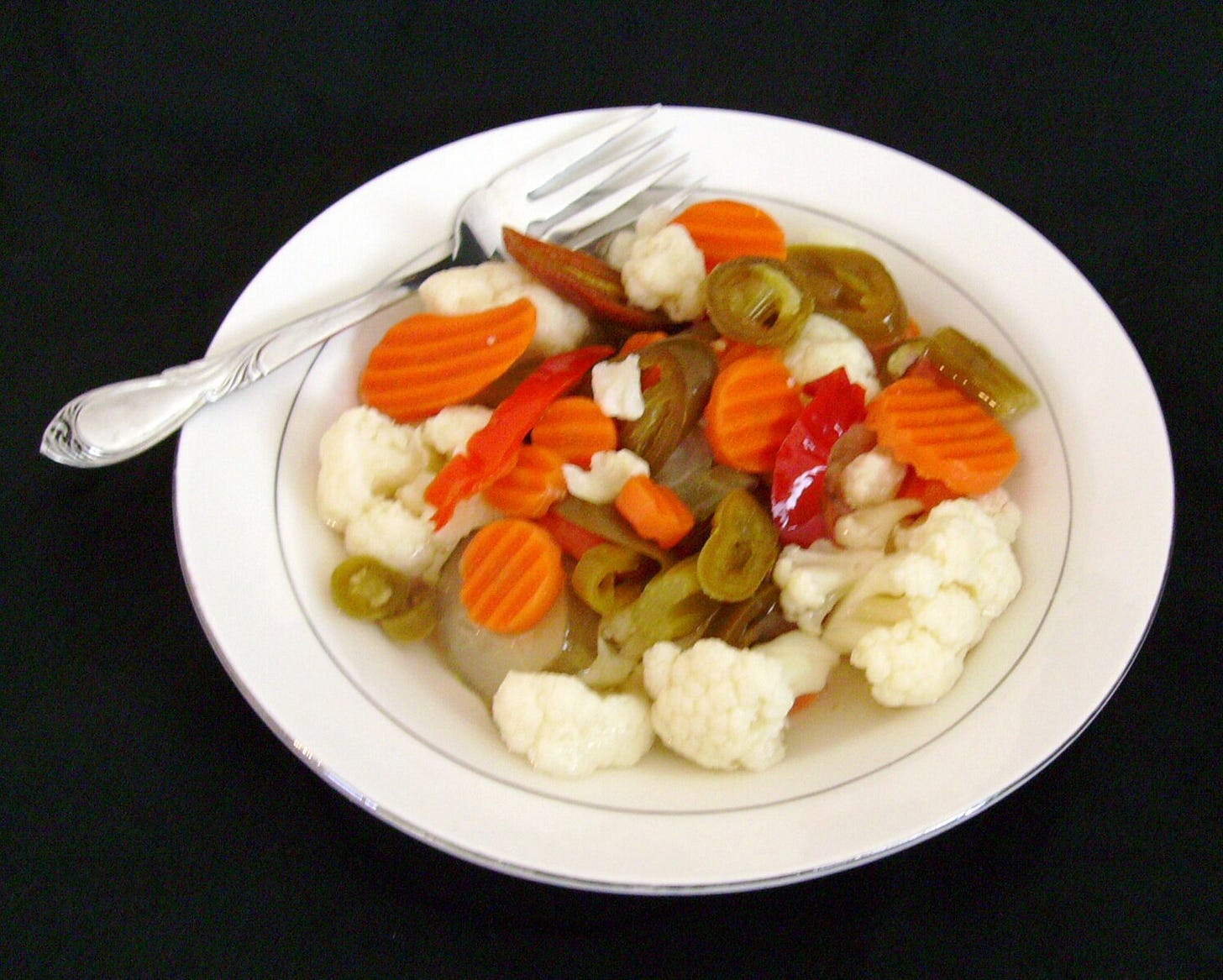
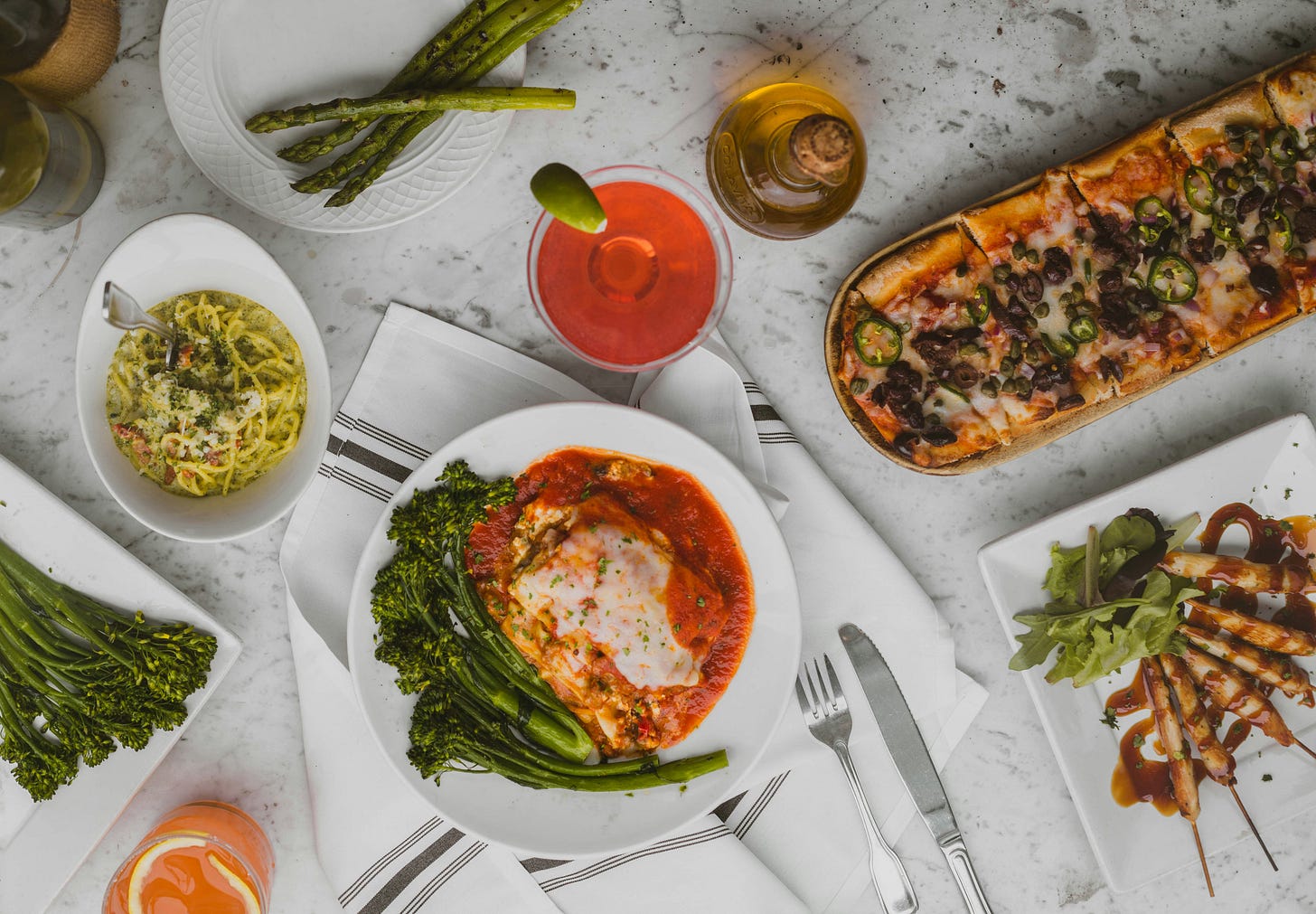

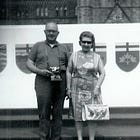



A number 10 can is 105 ounces. I'm not able to get them anymore so now I use four 29 ounce cans.
Just a hunch but the Giardiniera recipe was probably a variation with some local wine vinegar. Without the right vinegar, it won't be the same.